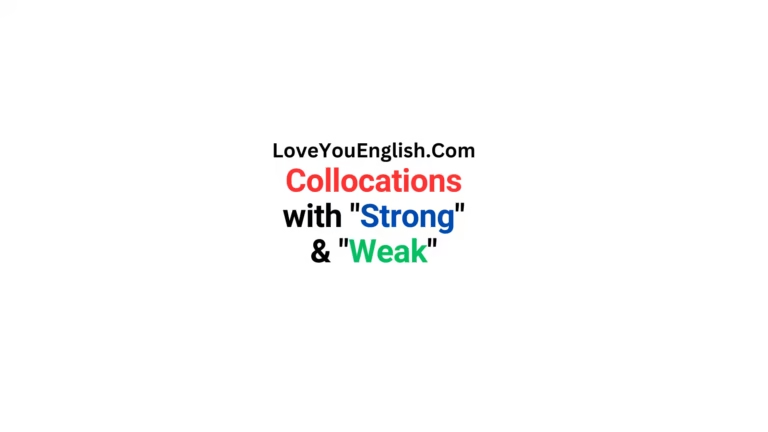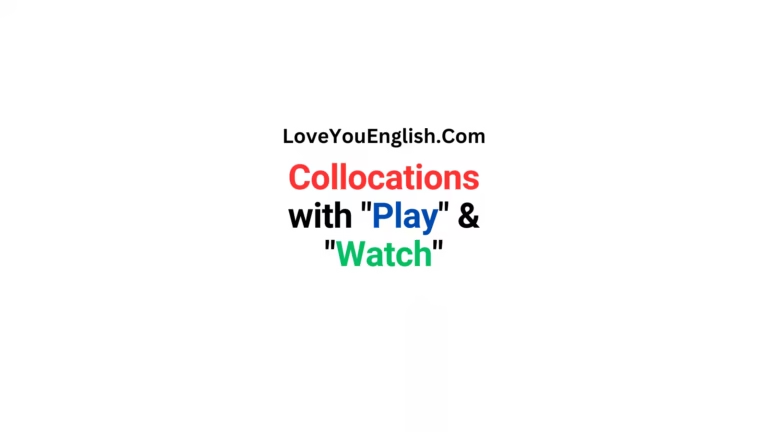40 Common English Collocations You Should Know
Have you ever heard someone say “make a mistake” or “do homework”?
These word pairs sound natural in English.
We call them collocations. A collocation is when two or more words go together. Native speakers use them all the time!
Learning collocations will help you sound more natural in English.
In this post, I will teach you 40 common English collocations. I will divide them into different groups to make them easy to understand. Let’s get started!
Collocations with “Make”
The verb “make” is used for creating or producing something.
- Make a mistake – (Example: I made a mistake in my test.)
- Make a decision – (Example: She made a decision to study hard.)
- Make friends – (Example: It is easy to make friends at school.)
- Make noise – (Example: The children are making noise in the park.)
- Make progress – (Example: He is making progress in learning English.)
Collocations with “Do”
The verb “do” is used for actions, jobs, and activities.
- Do homework – (Example: I always do my homework before playing.)
- Do the dishes – (Example: My sister does the dishes after dinner.)
- Do your best – (Example: Do your best in the exam!)
- Do a favor – (Example: Can you do me a favor?)
- Do exercise – (Example: We should do exercise every morning.)
Collocations with “Take”
The verb “take” is used when receiving or accepting something.
- Take a break – (Example: Let’s take a break from studying.)
- Take a photo – (Example: She took a photo of the sunset.)
- Take a shower – (Example: I take a shower every morning.)
- Take care – (Example: Take care of your little brother.)
- Take medicine – (Example: He took medicine for his headache.)
Collocations with “Have”
The verb “have” is used for experiences, meals, and actions.
- Have breakfast/lunch/dinner – (Example: I had lunch at school.)
- Have a good time – (Example: We had a good time at the party.)
- Have a bath – (Example: She has a bath before bed.)
- Have fun – (Example: We had fun at the park.)
- Have a conversation – (Example: They had a conversation about books.)
Collocations with “Give”
The verb “give” is used when offering something to someone.
- Give a speech – (Example: He gave a speech at the event.)
- Give a gift – (Example: She gave a gift to her friend.)
- Give advice – (Example: My teacher gave me good advice.)
- Give someone a hand – (Example: Can you give me a hand with this box?)
- Give an example – (Example: The teacher gave an example of a collocation.)
Collocations with “Go”
The verb “go” is used with movement and activities.
- Go shopping – (Example: We went shopping at the mall.)
- Go swimming – (Example: They go swimming every summer.)
- Go home – (Example: I go home after school.)
- Go for a walk – (Example: Let’s go for a walk in the park.)
- Go to bed – (Example: He goes to bed at 9 PM.)
Collocations with “Keep”
The verb “keep” is used to talk about continuing an action.
- Keep a promise – (Example: He always keeps his promises.)
- Keep a secret – (Example: Can you keep a secret?)
- Keep in touch – (Example: Let’s keep in touch after school.)
- Keep quiet – (Example: The teacher told us to keep quiet.)
- Keep going – (Example: Keep going, you are doing great!)
Collocations with “Pay”
The verb “pay” is used when giving money or attention.
- Pay attention – (Example: Pay attention in class.)
- Pay a fine – (Example: He paid a fine for parking in the wrong place.)
- Pay the bill – (Example: My father paid the bill at the restaurant.)
- Pay respect – (Example: We should pay respect to our elders.)
- Pay a visit – (Example: We paid a visit to our grandparents.)
Conclusion
Collocations help us speak English naturally. Instead of saying “do a mistake,” we say “make a mistake.” Instead of saying “take attention,” we say “pay attention.” Learning these phrases will make your English sound more fluent and correct.
Practice these collocations every day! Try using them in sentences, speaking them with friends, or writing them in a notebook.
Did you find this list helpful? Share this with your friends so they can learn too! Happy learning!







